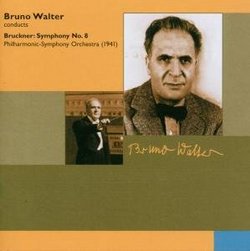| All Artists: Bruckner, Bruno Walter, Philharmonic-Symphony Orchestra Title: Bruno Walter Conducts Bruckner Symphony No. 8 Members Wishing: 0 Total Copies: 0 Label: Music & Arts Program Original Release Date: 1/1/2006 Release Date: 1/1/2006 Genres: Special Interest, Classical Styles: Historical Periods, Modern, 20th, & 21st Century, Symphonies Number of Discs: 1 SwapaCD Credits: 1 UPC: 017685110627 |
Search - Bruckner, Bruno Walter, Philharmonic-Symphony Orchestra :: Bruno Walter Conducts Bruckner Symphony No. 8
 | Bruckner, Bruno Walter, Philharmonic-Symphony Orchestra Bruno Walter Conducts Bruckner Symphony No. 8 Genres: Special Interest, Classical
|
Larger Image |
CD Details |
CD ReviewsHistoric and Musical Bruckner Howard F. Stein | Oklahoma CIty, OK USA | 04/14/2009 (5 out of 5 stars) "This CD has both historic and musical value. The sound is remarkably good for the 1940's. I grew up with Bruno Walter's Bruckher 4th and 9th and Te Deum. Since the 8th occupies a special place in my heart, not to mention my pantheon, I always wondered how Bruno Walter might have approached it. Occasionally, dreams come true. For me, the measure of an interpretation is not whether it somehow surpasses all others, but whether I can emotionally learn from it, whether my emotional life is deeper and richer because of it. Bruno Walter's 8th is such a performance." The first steps! Hiram Gomez Pardo | Valencia, Venezuela | 12/18/2006 (5 out of 5 stars) "Bruno Walter was undeniably, one of the most ardent defenders of Bruckner' s music and as well as the rest of his contemporary colleagues found a major resistance of this side of the Atlantic than Europe. And after the WW2 this tendency increased itself notably. Whereas Gustav Mahler became a spiritual guide for many people, Bruckner was relegated to a low profile status, reserved for special occasions.
Whereas the historical circumstances in which his music began to show itself it should not amaze us. The first three decades of the XX Century were filled of innovativeness: The raising of the cinema, the commercial aviation, the name of Stravinsky and the raising of new musical ensembles were not exactly the most favorable conditions for Bruckner ' s music blossomed. On the other hand, the awful fact Bruckner' s Seventh Symphony was so beloved by Hitler (believe or not) worked out as a negative boomerang for him that established conventional barriers that avoided his access to major horizons. But despite all the odds, Walter engaged himself over and over and his efforts were compensated at last, because among other virtues, the American audiences were aware about his generosity as human being. And so (as soon as Horenstein was labeled as Mahlerian supreme exponent, but despite all the odds also contributed in the Fifties with major intensity), undertook the aim to bring him to the great audiences. All of us know how the Bruckner's language permeated an entire generation during the WW2 and for many conductors (specially Furtwangler became a spiritual warrior against the Nazi regime), Bruckner received another treatment and we realize how directors of the stature of Van Beinum, Abendroth or Knapperstbusch included him in many concert programs, the audacious and rush in North America was not so accelerated. In many ways it might be stated Walter became Eighth' s musical ambassador, while Horenstein did it the same respect the Ninth. So according these factors, this musical document has special importance due Bruckner was slowly but gradually accepted among the reduced circle of audiences in the rest of the nation. Don' t miss it! " |

 Track Listings (5) - Disc #1
Track Listings (5) - Disc #1